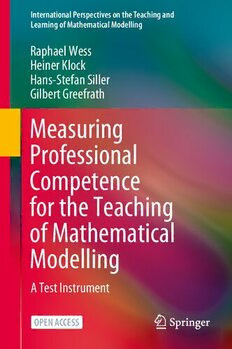
Measuring Professional Competence for the Teaching of Mathematical Modelling: A Test Instrument PDF
Preview Measuring Professional Competence for the Teaching of Mathematical Modelling: A Test Instrument
International Perspectives on the Teaching and Learning of Mathematical Modelling Raphael Wess Heiner Klock Hans-Stefan Siller Gilbert Greefrath Measuring Professional Competence for the Teaching of Mathematical Modelling A Test Instrument International Perspectives on the Teaching and Learning of Mathematical Modelling SeriesEditors GabrieleKaiser,FacultyofEducation,UniversityofHamburg,Hamburg,Germany GloriaAnnStillman,FacultyofEducationandtheArts,NationalSchoolof Education(Victoria),AustralianCatholicUniversity,Ballarat,VIC,Australia EditorialBoard MariaSalettBiembengut,UniversidadeRegionaldeBlumenau,Blumenau, SantaCatarina,Brazil WernerBlum,UniversityofKassel,Kassel,Hessen,Germany HelenDoerr,SyracuseUniversity,Knoxville,TN,USA PeterGalbraith,UniversityofQueensland,Brisbane,QLD,Australia ToshikazuIkeda,YokohamaNationalUniversity,Yokohama,Japan MogensNiss,RoskildeUniversity,Roskilde,Denmark JinxingXie,TsinghuaUniversity,Beijing,China Thisbookserieswillpublishvariousbooksfromdifferenttheoreticalperspectives aroundtheworldfocusingonTeachingandLearningofMathematicalModellingat Secondary and Tertiary level. The proceedings of the biennial conference called ICTMA, organised by the ICMI affiliated Study Group ICTMA (International Community of Teachers of Mathematical Modelling and Applications) will also bepublishedinthisseries.Theseproceedingsdisplaytheworldwidestate-of-the-art inthisfieldandwillbeofinterestforawideraudiencethantheconferencepartici- pants.ICTMAisaworldwideuniquegroup,inwhichnotonlymathematicseducators aiming for education at school level are included but also applied mathematicians interestedinteachingandlearningmodellingattertiarylevelarerepresented.ICTMA discussesallaspectsrelatedtoTeachingandLearningofMathematicalModellingat SecondaryandTertiaryLevel,e.g.usageoftechnologyinmodelling,psychological aspectsofmodellinganditsteaching,modellingcompetencies,modellingexamples andcourses,teachereducationandteachereducationcourses. Moreinformationaboutthisseriesathttp://www.springer.com/series/10093 · · · Raphael Wess Heiner Klock Hans-Stefan Siller Gilbert Greefrath Measuring Professional Competence for the Teaching of Mathematical Modelling A Test Instrument RaphaelWess HeinerKlock MathematicsandComputerScience MathematicsandComputerScience UniversityofMünster UniversityofWürzburg Münster,Germany Würzburg,Germany Hans-StefanSiller GilbertGreefrath MathematicsandComputerScience MathematicsandComputerScience UniversityofWürzburg UniversityofMünster Würzburg,Germany Münster,Germany ISSN2211-4920 ISSN2211-4939 (electronic) InternationalPerspectivesontheTeachingandLearningofMathematicalModelling ISBN978-3-030-78070-8 ISBN978-3-030-78071-5 (eBook) https://doi.org/10.1007/978-3-030-78071-5 ©TheEditor(s)(ifapplicable)andTheAuthor(s)2021.Thisbookisanopenaccesspublication. OpenAccessThisbookislicensedunderthetermsoftheCreativeCommonsAttribution4.0International License(http://creativecommons.org/licenses/by/4.0/),whichpermitsuse,sharing,adaptation,distribu- tionandreproductioninanymediumorformat,aslongasyougiveappropriatecredittotheoriginal author(s)andthesource,providealinktotheCreativeCommonslicenseandindicateifchangeswere made. Theimagesorotherthirdpartymaterialinthisbookareincludedinthebook’sCreativeCommonslicense, unlessindicatedotherwiseinacreditlinetothematerial.Ifmaterialisnotincludedinthebook’sCreative Commonslicenseandyourintendeduseisnotpermittedbystatutoryregulationorexceedsthepermitted use,youwillneedtoobtainpermissiondirectlyfromthecopyrightholder. Theuseofgeneraldescriptivenames,registerednames,trademarks,servicemarks,etc.inthispublication doesnotimply,evenintheabsenceofaspecificstatement,thatsuchnamesareexemptfromtherelevant protectivelawsandregulationsandthereforefreeforgeneraluse. Thepublisher,theauthorsandtheeditorsaresafetoassumethattheadviceandinformationinthisbook arebelievedtobetrueandaccurateatthedateofpublication.Neitherthepublishernortheauthorsor theeditorsgiveawarranty,expressedorimplied,withrespecttothematerialcontainedhereinorforany errorsoromissionsthatmayhavebeenmade.Thepublisherremainsneutralwithregardtojurisdictional claimsinpublishedmapsandinstitutionalaffiliations. ThisSpringerimprintispublishedbytheregisteredcompanySpringerNatureSwitzerlandAG Theregisteredcompanyaddressis:Gewerbestrasse11,6330Cham,Switzerland Series Preface Applicationsandmodellingandtheirlearningandteachinginschoolanduniversity havebecomeaprominenttopicformanydecadesnowinviewofthegrowingworld- wide relevance of the usage of mathematics in science, technology and everyday life. There is consensus that modelling should play an important role in mathe- maticseducation,andthesituationinschoolsanduniversityisslowlychangingto includereal-worldaspects,frequentlywithmodellingasrealworldproblemsolving, in several educational jurisdictions. Given the worldwide continuing shortage of students who are interested in mathematics and science, it is essential to discuss changesofmathematicseducationinschoolandtertiaryeducationtowardstheinclu- sionofrealworldexamplesandthecompetenciestousemathematicstosolvereal worldproblems. ThisinnovativebookseriesestablishedbySpringerInternationalPerspectiveson theTeachingandLearningofMathematicalModelling,aimsatpromotingacademic discussionontheteachingandlearningofmathematicalmodellingatvariouseduca- tionallevelsallovertheworld.Theserieswillpublishbooksfromdifferenttheoretical perspectives from around the world dealing with Teaching and Learning of Math- ematicalModelling inSchooling and atTertiarylevel.Thisserieswillalsoenable theInternationalCommunityofTeachersofMathematicalModellingandApplica- tions(ICTMA),anInternationalCommissiononMathematicalInstructionaffiliated StudyGroup,topublishbooksarisingfromitsbiennialconferenceseries.ICTMAisa uniqueworldwideeducationalresearchgroupwherenotonlymathematicseducators dealingwitheducationatschoollevelareincludedbutalsoappliedmathematicians interestedinteachingandlearningmodellingattertiarylevelarerepresentedaswell. SixofthesebookspublishedbySpringerhavealreadyappeared. Theplannedbooksdisplaytheworldwidestate-of-the-artinthisfield,mostrecent educationalresearchresultsandnewtheoreticaldevelopmentsandwillbeofinterest forawideaudience.Themesdealtwithinthebooksfocusontheteachingandlearning of mathematical modelling in schooling from the early years and at tertiary level includingtheusageoftechnologyinmodelling,psychological,social,historicaland culturalaspectsofmodellinganditsteaching,learningandassessment,modelling competencies,curricularaspects,teachereducationandteachereducationcourses. v vi SeriesPreface Thebookseriesaimstosupportthediscussiononmathematicalmodellingandits teachinginternationallyandwillpromotetheteachingandlearningofmathematical modellingandresearchofthisfieldallovertheworldinschoolsanduniversities. The series is supported by an editorial board of internationally well-known scholars, who bring in their long experience in the field as well as their expertise to this series. The members of the editorial board are: Maria Salett Biembengut (Brazil),WernerBlum(Germany),HelenDoerr(USA),PeterGalbraith(Australia), ToshikazuIkeda(Japan),MogensNiss(Denmark),andJinxingXie(China). We hope this book series will inspire readers in the present and the future to promotetheteachingandlearningofmathematicalmodellingallovertheworld. SeriesEditors Hamburg,Germany GabrieleKaiser Ballarat,Australia GloriaAnnStillman Introduction From a mathematics education perspective, initiating and evaluating modelling processes offers a great potential for the acquisition of competences by students. Throughthechoiceofappropriatetasksandinterventions,allow,interalia,aclose connection to reality as well as a high degree of independence and openness, thus allowing individual access to mathematics and multiple solution approaches at differentlevels(SchukajlowandKrug,2013).Atthesametime,thegreatpotentialof thesemathematicalmodellingprocessesposesachallengefor(pre-service)teachers (Kuntze, Siller and Vogel, 2013). For this reason, a close examination of possible support measures to develop professional competence for teaching mathematical modelling in the sense of quality development in teacher education is necessary (Blum,2015). Inthiscontext,theoperationalisationofmodelling-specificprofessionalcompe- tence is an important and relatively new field of research (Borromeo Ferri, 2019) towhichwewishtocontributewiththisbook.Indoingso,weunderstandcompe- tencesascontext-specific,cognitivedispositionsforachievementthatarefunction- allyrelatedtospecificsituationsandrequirements(Klieme,HartigandRauch,2008), sothatnotonlydeclarativebutalsoprocedural,situation-relatedknowledgefacets arefocused. Modelsdescribingtherequirementsforpre-serviceteachersareneededtomeasure the above competences. A structural model of professional competence to teach mathematical modelling was developed as part of a cooperation1 between several Germanuniversitiesandwasempiricallyconfirmedtoagreatextent(Klock,Wess, GreefrathandSiller,2019;Wess,Klock,GreefrathandSiller,2021).Amongother things,thismodelformsthebasisfortheconceptualisationandoperationalisationof specificdidacticknowledgefacetsaswellasotheraffective-motivationalcomponents ofmodelling-specificteacherprofessionalism. 1This project is part of the “Qualitätsoffensive Lehrerbildung”, a joint initiative of the Federal GovernmentandtheLänderwhichaimstoimprovethequalityofteachertraining.Theprogramme isfundedbytheFederalMinistryofEducationandResearch.Theauthorsareresponsibleforthe contentofthispublication. vii viii Introduction Inordertopresentthisstructureandtherelatedtestinstrumentinacomprehensive manner,thefirstpartofthebookgivesanoverviewofselectedconceptsandtheo- retical backgrounds of mathematical modelling. This is followed by explanations ontheconceptofcompetenceusedhereandofdifferentcompetencemodelsbefore specific competence dimensions for teaching mathematical modelling are consid- ered. Finally, these are used to interpret a structural model of modelling-specific professionalcompetenceandserveasabasisfortestconstruction. Thesecondpartpresentsoperationalisationandthetestinstrumentastheproduct ofthisprocess.Inthiscontext,theprimaryfocusisontheanalysisofthequalitywith which the quantitative test instrument measures the aspects of modelling-specific professionalcompetence. In the final part, the possibilities of use, but also limitations of the instrument, are discussed and further implications for research and practical applications are highlighted. Contents PartI TheoreticalBackground 1 MathematicalModelling ........................................ 3 1.1 TermsandDefinitionsUsedinMathematicalModelling .......... 3 1.1.1 MathematicalModellingandMathematicalModel ........ 4 1.1.2 ModellingProcessesandModellingCycles .............. 5 1.1.3 ModellingCompetencies .............................. 7 1.2 AimsandPerspectivesofMathematicalModelling .............. 8 1.3 ModellingTasks ............................................ 11 1.3.1 GeneralCategoriesofTasks ........................... 11 1.3.2 TaskCategoriesforRealisticTasks ..................... 12 1.3.3 SelectedCriteriaforModellingTasks ................... 14 1.4 DifficultiesintheModellingProcess .......................... 15 1.5 InterventionsintheModellingProcess ........................ 17 2 ProfessionalCompetenceforTeachingMathematicalModelling .... 21 2.1 TheConceptofCompetence ................................. 22 2.2 ProfessionalCompetenceofTeachers ......................... 22 2.2.1 ProfessionalCompetence ............................. 23 2.2.2 Conceptualisations of Professional Competence ofMathematicsTeachers .............................. 24 2.3 Competence Dimensions for Teaching Mathematical Modelling ................................................. 26 2.4 ACompetenceModelforTeachingMathematicalModelling ..... 28 2.4.1 Modelling-SpecificPedagogicalContentKnowledge ...... 30 2.4.2 BeliefsRegardingMathematicalModelling .............. 31 2.4.3 Self-Efficacy Expectations for Mathematical Modelling ........................................... 33 2.4.4 EmpiricalValidationoftheStructuralModel ............. 34 ix
